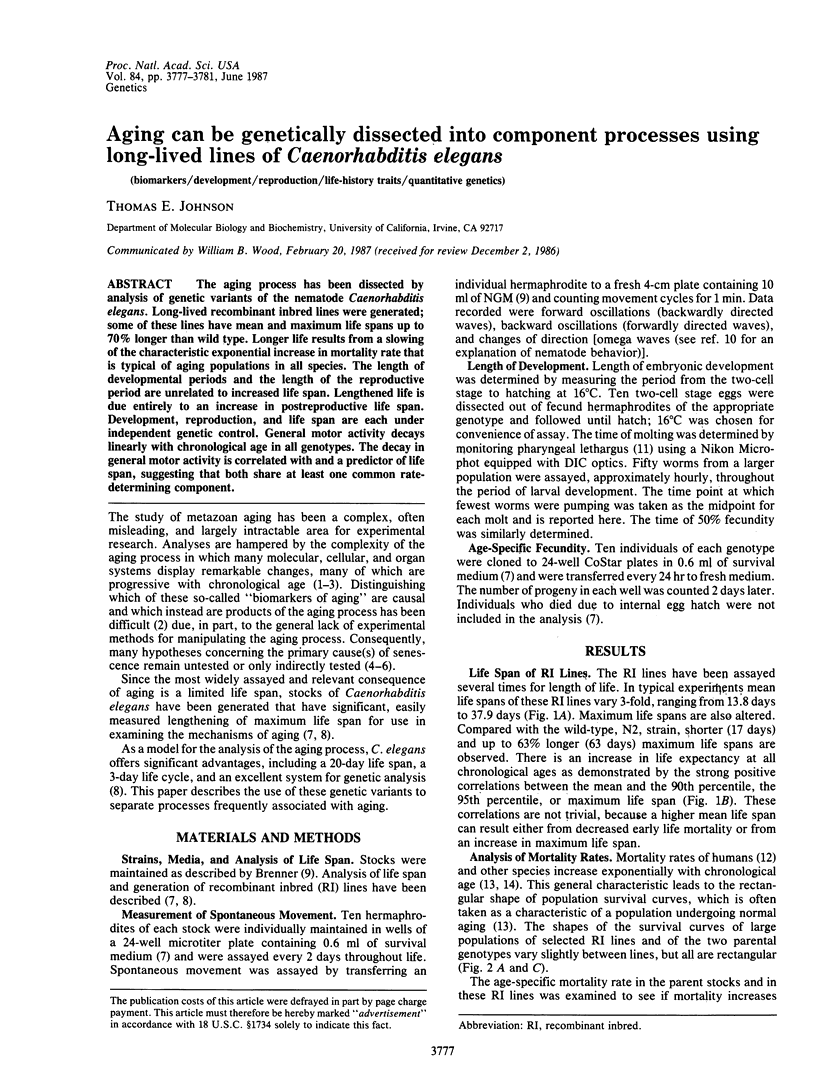Aging can be genetically dissected into component processes using long-lived lines of Caenorhabditis elegans (original) (raw)
Abstract
The aging process has been dissected by analysis of genetic variants of the nematode Caenorhabditis elegans. Long-lived recombinant inbred lines were generated; some of these lines have mean and maximum life spans up to 70% longer than wild type. Longer life results from a slowing of the characteristic exponential increase in mortality rate that is typical of aging populations in all species. The length of developmental periods and the length of the reproductive period are unrelated to increased life span. Lengthened life is due entirely to an increase in postreproductive life span. Development, reproduction, and life span are each under independent genetic control. General motor activity decays linearly with chronological age in all genotypes. The decay in general motor activity is correlated with and a predictor of life span, suggesting that both share at least one common rate-determining component.

Selected References
These references are in PubMed. This may not be the complete list of references from this article.
- Bolanowski M. A., Russell R. L., Jacobson L. A. Quantitative measures of aging in the nematode Caenorhabditis elegans. I. Population and longitudinal studies of two behavioral parameters. Mech Ageing Dev. 1981 Mar;15(3):279–295. doi: 10.1016/0047-6374(81)90136-6. [DOI] [PubMed] [Google Scholar]
- Botstein D., Maurer R. Genetic approaches to the analysis of microbial development. Annu Rev Genet. 1982;16:61–83. doi: 10.1146/annurev.ge.16.120182.000425. [DOI] [PubMed] [Google Scholar]
- Brenner S. The genetics of Caenorhabditis elegans. Genetics. 1974 May;77(1):71–94. doi: 10.1093/genetics/77.1.71. [DOI] [PMC free article] [PubMed] [Google Scholar]
- Byerly L., Cassada R. C., Russell R. L. The life cycle of the nematode Caenorhabditis elegans. I. Wild-type growth and reproduction. Dev Biol. 1976 Jul 1;51(1):23–33. doi: 10.1016/0012-1606(76)90119-6. [DOI] [PubMed] [Google Scholar]
- Croll N. A., Smith J. M., Zuckerman B. M. The aging process of the nematode Caenorhabditis elegans in bacterial and axenic culture. Exp Aging Res. 1977 May;3(3):175–189. doi: 10.1080/03610737708257101. [DOI] [PubMed] [Google Scholar]
- Gould A. B., Clark A. M. X-ray induced mutations causing adult life-shorting in Drosophila melanogaster. Exp Gerontol. 1977;12(3-4):107–112. doi: 10.1016/0531-5565(77)90017-1. [DOI] [PubMed] [Google Scholar]
- Ingram D. K. Toward the behavioral assessment of biological aging in the laboratory mouse: concepts, terminology, and objectives. Exp Aging Res. 1983 Winter;9(4):225–238. doi: 10.1080/03610738308258457. [DOI] [PubMed] [Google Scholar]
- Johnson T. E., Mitchell D. H., Kline S., Kemal R., Foy J. Arresting development arrests aging in the nematode Caenorhabditis elegans. Mech Ageing Dev. 1984 Nov;28(1):23–40. doi: 10.1016/0047-6374(84)90150-7. [DOI] [PubMed] [Google Scholar]
- Johnson T. E. Molecular and genetic analyses of a multivariate system specifying behavior and life span. Behav Genet. 1986 Jan;16(1):221–235. doi: 10.1007/BF01065487. [DOI] [PubMed] [Google Scholar]
- Johnson T. E., Wood W. B. Genetic analysis of life-span in Caenorhabditis elegans. Proc Natl Acad Sci U S A. 1982 Nov;79(21):6603–6607. doi: 10.1073/pnas.79.21.6603. [DOI] [PMC free article] [PubMed] [Google Scholar]
- Klass M. R. A method for the isolation of longevity mutants in the nematode Caenorhabditis elegans and initial results. Mech Ageing Dev. 1983 Jul-Aug;22(3-4):279–286. doi: 10.1016/0047-6374(83)90082-9. [DOI] [PubMed] [Google Scholar]
- Klass M., Hirsh D. Non-ageing developmental variant of Caenorhabditis elegans. Nature. 1976 Apr 8;260(5551):523–525. doi: 10.1038/260523a0. [DOI] [PubMed] [Google Scholar]
- Schneider E. L., Reed J. D., Jr Life extension. N Engl J Med. 1985 May 2;312(18):1159–1168. doi: 10.1056/NEJM198505023121805. [DOI] [PubMed] [Google Scholar]
- Sulston J. E., Schierenberg E., White J. G., Thomson J. N. The embryonic cell lineage of the nematode Caenorhabditis elegans. Dev Biol. 1983 Nov;100(1):64–119. doi: 10.1016/0012-1606(83)90201-4. [DOI] [PubMed] [Google Scholar]
- Swanson M. M., Riddle D. L. Critical periods in the development of the Caenorhabditis elegans dauer larva. Dev Biol. 1981 May;84(1):27–40. doi: 10.1016/0012-1606(81)90367-5. [DOI] [PubMed] [Google Scholar]
- Ward S., Carrel J. S. Fertilization and sperm competition in the nematode Caenorhabditis elegans. Dev Biol. 1979 Dec;73(2):304–321. doi: 10.1016/0012-1606(79)90069-1. [DOI] [PubMed] [Google Scholar]